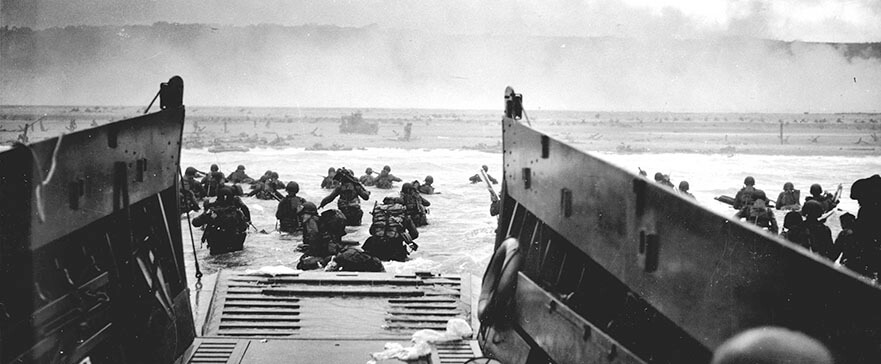Only a small fraction of the heroes of D-Day live on today to keep its memories alive, as we commemorate the 80th anniversary of that signal event which, to a large degree, saved the world from tyranny.
“Our sons, pride of our Nation, this day have set upon a mighty endeavor, a struggle to preserve our Republic, our religion, and our civilization, and to set free a suffering humanity,” prayed President Franklin Delano Roosevelt in his radio address on June 6, 1944. “Lead them straight and true; give strength to their arms, stoutness to their hearts, steadfastness in their faith.” Roosevelt famously distributed New Testaments (also containing the Psalms) to the troops.
Operation Overlord, commonly known as D-Day, involved the mobilization of more than 179,000 Allied troops who strategically attacked the beaches of Normandy, France. The Nazis controlled this area and had gone to great lengths to reinforce their defensive position. The Allies attacked from the sea and by the air. Many troops exited their landing crafts only to sacrifice themselves before ever reaching the beaches called Utah, Omaha, Gold, Juno, and Sword. Paratroopers jumped behind enemy lines, and Army Rangers heroically scaled the cliffs—although so many were injured or killed in the grisly process. These thousands of soldiers and sailors understood that the events of that day could very well mean their own demise, but they proceeded in the hopes that their efforts would contribute to a greater victory.
“These are the champions who helped free a continent. These are the heroes who helped end a war.”
“These are the boys of Pointe du Hoc,” as President Ronald Reagan stated so eloquently in Normandy on the 40th anniversary of D-Day in 1984. “These are the men who took the cliffs. These are the champions who helped free a continent. These are the heroes who helped end a war.”
D-Day was indeed the beginning of the end for the Axis powers, who commenced their surrender within a year. Of course, the outcome was anything but certain on that foggy morning of June 6.
Reagan summarized all that was at stake: “For four long years, much of Europe had been under a terrible shadow. Free nations had fallen, Jews cried out in the camps, millions cried out for liberation. Europe was enslaved, and the world prayed for its rescue.”
It would be 10 months before American troops would liberate Ohrdruf and the reality of the concentration camps would become widely known among the United States’ troops and citizens. Yet, Jewish soldiers already understood that they carried a burden even greater than that of their fellow soldiers.
“There was an internal conflict that they had,” stated historian Dr. Tim Schmig. “‘If I’m captured, will I be treated like a soldier in uniform, or will I be exterminated?’”
While Jewish American soldiers had the option of disguising their identities, many chose to proclaim their Hebrew heritage by having an H imprinted on their dog tags.
Schmig said that while Jewish American soldiers had the option of disguising their identities, many chose to proclaim their Hebrew heritage by having an H imprinted on their dog tags.
Dr. Peter Colón is a Church Ministries representative for The Friends of Israel. He has a fascination with studying World War II, particularly D-Day, and took part in a very realistic D-Day reenactment 10 years ago on its 70th anniversary.
Colón portrayed the role of Lt. Col. George Russell Barber, a chaplain on Omaha Beach. Barber later witnessed the concentration camp in Nordhausen, Germany, firsthand and assisted in the establishment of the famous Normandy American Cemetery. Barber died on December 17, 2004—the final surviving D-Day chaplain.
Colón concurred that many Jewish soldiers showed great courage on the beaches of Normandy. “One Jewish soldier refused to change his dog tag and even drew a large Star of David on the back of his service jacket before the landing,” Colón stated.
More than 1.5 million Jewish troops served among the Allies. The United States was home for 550,000 of them. Yad Vashem records: “Some 10,000 were killed in combat, and more than 36,000 received citations. Many Jewish soldiers took part in liberating the camps.”
“You will see the Star of David at different cemeteries in Europe,” Schmig stated, adding that it is especially noticeable at Normandy.
It’s been 80 years—the duration of a lifetime—since those brave young men went willingly onto the beaches of Normandy to preserve what Winston Churchill called “Christian civilization.” Today, as in 1944, we must pray as Roosevelt did: “O Lord, give us faith. Give us faith in Thee.”
Photo Credit: U.S. Coast Guard




